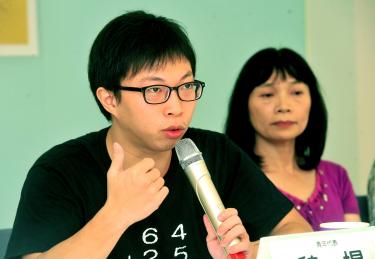The recently concluded visit of China’s Taiwan Affairs Office (TAO) Minister Zhang Zhijun (張志軍) exposed the danger of the President Ma Ying-jeou (馬英九) administration’s attempt to merge “two distinctively different civilizations and the fragility of Taiwan’s democracy and civic society,” panelists at a symposium said yesterday.
“Never think that the tragedy of the 228 Incident cannot happen in the 21st century,” retired National Taiwan University professor Kenneth Lin (林向愷) told the symposium, organized by the Taiwan Association of University Professors.
The brutal massacre in 1947 — which was violently suppressed by the Chinese Nationalist Party (KMT) government, wiping out almost an entire generation of Taiwanese elites — was a clash of two civilizations, Taiwan and China, Lin said, adding that they were forcibly merged by the KMT regime.
Reviewing the Ma administration’s handling of a series of protests against Zhang, Lin said that while most people had great expectations about the Economic Cooperation Framework Agreement (ECFA) three years ago, many now realize that “ordinary people are not in the winner’s circle in terms of cross-strait economic integration.”
“With growing Chinese influences of their lives, people realize that the economic and political systems across the Taiwan Strait are so different that they could not possibly be integrated. This mentality was shown in the increase in the number of people who upheld the ‘refusal of unification’ after Ma took office in 2008,” Lin added.
Ma would be making a grave mistake if he has not sensed the changing political climate in Taiwan, as most participants in the protests during visits by former Association of Relations Across the Taiwan Straits chairman Chen Yunlin (陳雲林) were senior citizens, but the majority of protesters in the past week were young people, the professor said.
“What I saw was the fragility of Taiwan’s democracy and civil society,” Hsueh Hua-yuan (薛化元), head of the Graduate Institute of Taiwan History at National Chengchi University, said about the aftermath of Zhang’s visit, which saw public discussion focused on the “courtesy and hospitality” of the nation.
Many analysts and politicians concluded that while the motivations behind the protests were just, the means were questionable because they violated Taiwanese tradition.
The issues in question were neither about courtesy nor hospitality, but the state apparatus’ abuse of power and violation of the constitutionally protected right of expression, Hsueh said.
“Saying that the ‘excessive protests’ jeopardized Taiwan’s image is as illogical as talking about free trade with China — an abnormal free economic system from head to toe,” Hsueh said.
“To me, Zhang was anything but a guest. He was an aggressor with a smile on his face,” said Yen Ming-wei (顏銘緯), a high-school graduate who participated in protests in Greater Kaohsiung.
Dennis Wei (魏揚), a student at National Tsing Hua University who was arrested during a protest in New Taipei City, agreed, saying that the discussion of politeness reflected that Taiwan’s democratic movement should be deepened and strengthened.
Wei expressed his “unsurprising disappointment” in the Democratic Progressive Party (DPP), which chose not to organize any protests this time, urging the party to “be clear with its China policy and positions.”
The DPP’s position on several issues, including the proposed free economic pilot zones and the cross-strait service trade agreement, have been vague, but “[the DPP] could not expect to win more votes by its eclecticism,” Wei said.
“The simple fact that students and young people were left protesting on the street alone means that the DPP has not been doing its job and has not worked hard enough,” Wei said.
Source: Taipei Times - 2014/06/30





















